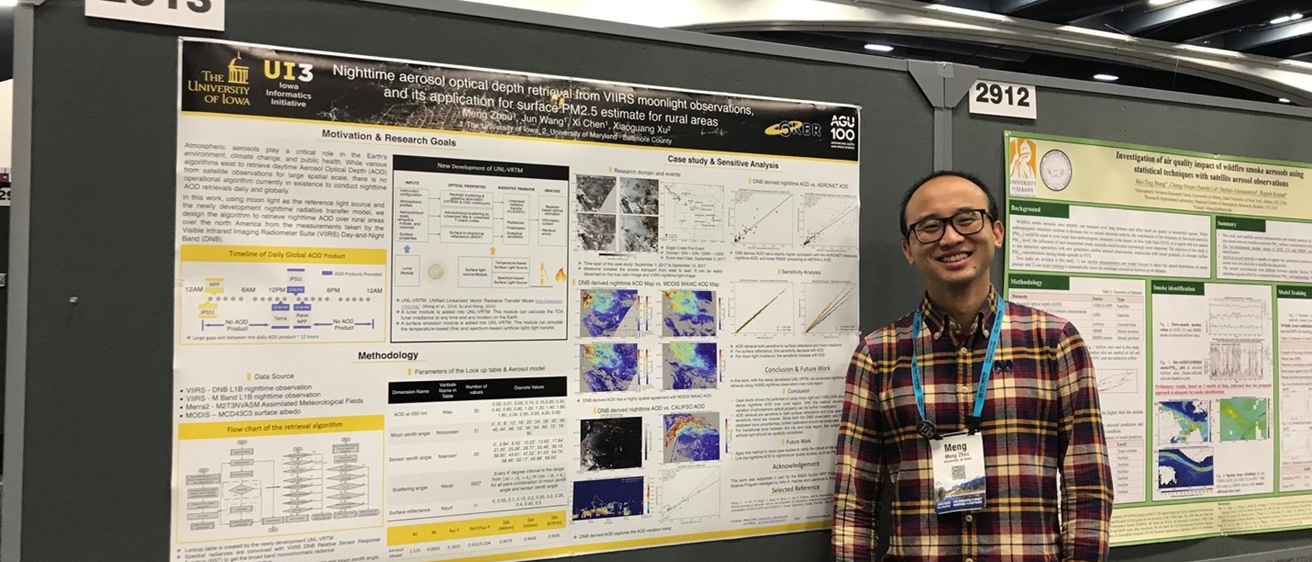Meng Zhou, from China, recently earned his PhD in informatics from the University of Iowa and has embarked on a new role as an assistant scientist at the National Aeronautics and Space Administration (NASA).
His research focuses on using satellite remote sensing to monitor environmental conditions, particularly pollutants like PM2.5 and nighttime wildfires. The unique aspect of Zhou’s work is that he utilizes sensors that operate at night, leveraging moonlight scattered by polluted air to monitor air quality. For wildfires, he developed an innovative algorithm to assess their intensity and combustion phases, providing critical data on how many pollutants, such as PM2.5, black carbon, and CO, will be emitted to the air by the wildfire.
“The NASA FINESST Fellowship Award is highly competitive, attracting candidates from across the graduate student and early-career post-doctorate spectrum nationwide, with a selection rate of 10-15%. This demonstrates that graduate students from the University of Iowa are just as capable as those from institutions like Harvard and Yale."
Reflecting on his decision to pursue his graduate studies at Iowa, Zhou credited a recommendation from a high school friend and the opportunity to work with Dr. Jun Wang, professor and interim chair of the Department of Chemical and Biochemical Engineering. “My friend was a PhD student at Iowa. Alumni recommendations are crucial for attracting international students,” remarked Zhou.
Under the mentorship of Dr. Jun Wang, Zhou contributed to the NASA-NOAA FIREX-AQ Campaign, aimed at understanding wildfires' causes and impacts. He developed a new fire detection algorithm that offers a more comprehensive identification of wildfires and provides information on fire intensity and combustion phases.
“My algorithm has been selected by NASA as the next-generation fire detection and combustion efficiency product,” said Zhou. “This significant development is scheduled to be operationalized by NASA on a daily basis for wildfire data production starting this summer, representing a substantial contribution to environmental monitoring and safety.”
During his time at Iowa, Zhou received the Iowa Informatics Initiative Graduate Fellowship from 2017 to 2020, and the prestigious NASA FINESST Fellowship from 2021 to 2023. He also secured the first place Oral Presentation/Student Paper Award from the American Meteorological Society for three consecutive years (2021-2023) and published 18 peer-reviewed papers in esteemed journals.

“The NASA FINESST Fellowship Award is notable not only for its honor but also because it is the sole fellowship available to international students offered by NASA,” said Zhou. “It is highly competitive, attracting candidates from across the graduate student and early-career post-doctorate spectrum nationwide, with a selection rate of 10-15%. This demonstrates that graduate students from the University of Iowa are just as capable as those from institutions like Harvard and Yale.”
Zhou expressed his gratitude for the welcoming atmosphere and support he received at Iowa. "I deeply appreciate the diversity inclusion, and friendly environment that the University of Iowa provides," shared Zhou. "When I first arrived, International Student and Scholar Services offered a lot of useful guidance and resources, which were incredibly helpful."

“I would like to express my sincere gratitude to my advisor, Dr. Jun Wang. Without his guidance and resources, I would not be where I am today. I am also grateful for the Iowa Informatics Initiative and their Graduate Fellowship support, which meant a lot to me as an international student,” said Zhou. “The staff I worked with at the Iowa Informatics Initiative, the College of Engineering, and the Department of Computer Science were also very supportive. Their timely help and advice made a significant difference in my academic journey. ”
When asked for advice for fellow international students, Zhou said, "The process of pursuing a PhD can be challenging and sometimes difficult, but a supportive group of friends can help you get through those tough times." He also emphasized the inclusive and friendly environment at Iowa, which allowed him to forge meaningful friendships, making the university feel like home.
"Of course, being mentally strong is equally important. While good friends can help you through certain hardships, ultimately, you need to be independent and face the challenges of living overseas and pursuing your academic path," added Zhou. "Lastly, don't be afraid to speak out. The more you speak, the more people will understand you, and the better your oral English will become."
International Programs (IP) at the University of Iowa (UI) is committed to enriching the global experience of UI students, faculty, staff, and the general public by leading efforts to promote internationally oriented teaching, research, creative work, and community engagement. IP provides support for international students and scholars, administers scholarships and assistance for students who study, intern, or do research abroad, and provides funding opportunities and grant-writing assistance for faculty engaged in international research. IP shares their stories through various media, and by hosting multiple public engagement activities each year.
